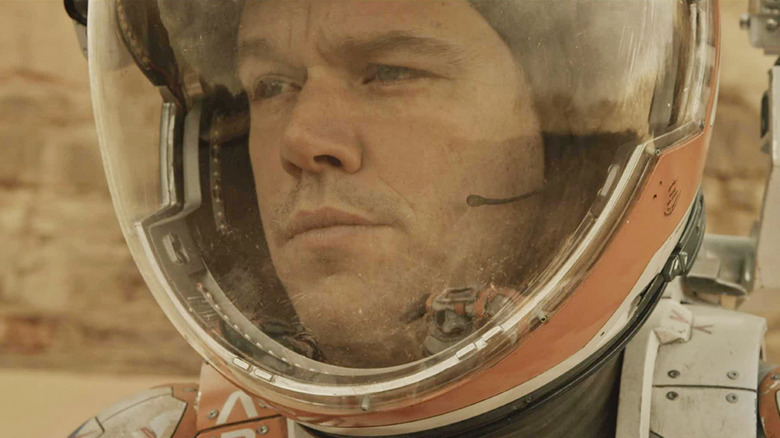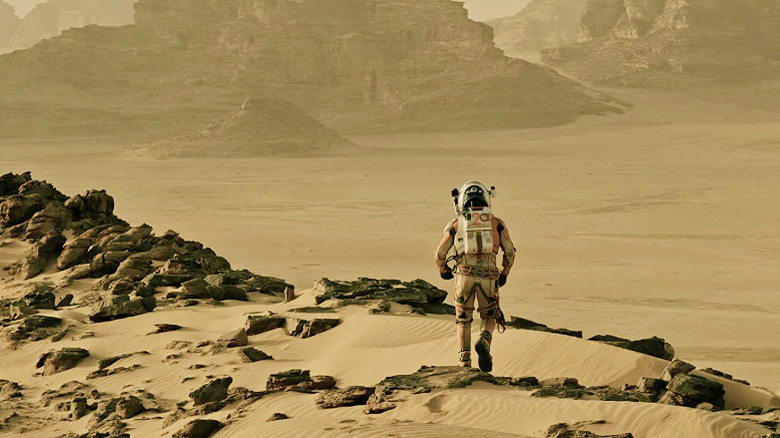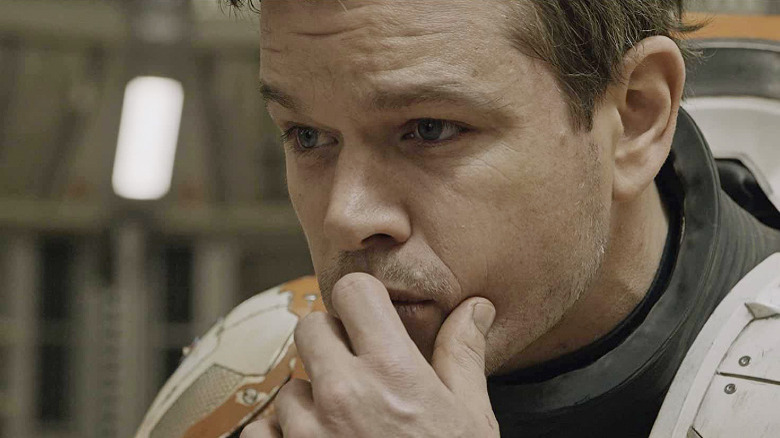Ridley Scott And Matt Damon Shot The Martian At A Breakneck Speed
2015's "The Martian" is a far lighter and funnier sci-fi movie than its premise might suggest (which is not to say it's a comedy — I'm looking at you, Hollywood Foreign Press Association). Set in the year 2035, the film stars Matt Damon as Mark Watney, a cheeky NASA astronaut who's accidentally stranded on Mars after a mission to the red planet goes sideways. Left on his own, Mark proceeds to make a video diary about his efforts to stay alive until NASA can formulate a plan to bring him safely home. Elsewhere, his fellow space travelers decide to take matters into their own hands as they make their way back to Earth.
Much of the comedy in "The Martian" comes in the form of Mark's gallows humor, whether he's making light of his dire situation or cracking wise about his mission commander Melissa Lewis (Jessica Chastain) and her love of groovy 1970s disco tunes. (For the record, I myself dig Melissa's taste in music.) Also helping to prevent the story from becoming too downbeat is Ridley Scott's direction, which keeps the movie flowing at a brisk pace. Even when Mark's situation takes a turn for the worse, Scott only lingers on the drama long enough to ensure viewers never forget how quickly — and easily — things could go very, very wrong for our hero.
This light touch extended to the film's production, which only took 72 days to finish according to an interview Scott gave to Entertainment Weekly in September 2015. That's pretty dang speedy for a $108 million space adventure, even for Scott (a filmmaker who, as of 2022, has directed 27 movies over the course of 45 years).
'The key is to know what you're doing'
In the past, Ridley Scott has likened his approach to directing to that of a painter who steadily crafts a clear, striking image on their canvas. "The key is to know what you're doing," he explained to Entertainment Weekly. "If you do 90 takes it means you don't really know what you want."
This is also why Scott feels it's important to figure out as much of any movie as possible in pre-production. That includes casting the right actors for the right jobs ahead of time, rather than hiring someone you're not entirely comfortable with and hoping they can manage their role. "When you cast well, the actors are going to help you on the day. So you cast people who will become partners and that's how you move so fast," he explained. It's all about trust, Scott added:
"[The actors] trust me. I trust them. Most great actors will say: I'm going to get [the scene] in two [takes]. So if we go on to do 19 takes I don't know what I'm doing anymore. I learned that way back when. They've come in totally prepared and you do not want a long dissertation about their cat dying, and their mother isn't well and the house just burned down. They'll look at you and be like, 'What are you doing? You're f****** with my head!'"
When it came to "The Martian," Scott was further afforded the benefit of a sharp, tight script by Drew Goddard ("The Cabin in the Woods"), itself adapted from the 2011 novel of the same name by Andy Weir. Thanks to his no-muss, no-fuss methods, Scott told Entertainment Weekly that Matt Damon would often refer to him as "Two Take Charlie" during shooting.
The complicated legacy of The Martian
"The Martian" is very much a product of its time, and not just because it's a big-budget, non-franchise film that's geared towards adults and grossed $653.6 million at the box office. It's also a decidedly humanist movie with an optimistic outlook on people's willingness to help those in need when they don't stand to gain from it materially. This type of hopefulness and confidence in humanity went down easier in 2015 but can feel almost naive in 2022. In contrast, the film's championing of the scientific method and the importance of addressing problems by using logic and reasoning (not fear and greed) has only grown more and more relevant with time.
On the flip side, one could argue "The Martian" has the same core issue as "Interstellar" (which came out the year before it). Both films have been accused of presenting space travel as a far more realistic solution to the biggest problems facing humanity and its future — like the effects of human-caused climate change — than it actually is. It doesn't help that NASA played a hands-on role in making "The Martian," to the degree that it acts as propaganda designed to encourage greater governmental spending on the space agency. Is that, per se, a bad thing? Not necessarily, given the many ways that technology developed by NASA for space travel over the years has benefited everyday life on Earth. It's a complicated situation.
Perhaps the best way to appreciate "The Martian" today is to take its core message to heart: All we can do is solve one problem, then move on to the next. And maybe if we're lucky like Mark, we will solve enough problems that we too will get to, as he puts it in the movie, "come home."


